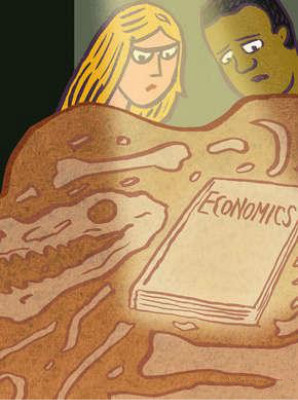經(jīng)濟(jì)學(xué)教育
The demand side
需求方
The economics curriculum is evolving, but too slowly for some
經(jīng)濟(jì)學(xué)課程正在不斷發(fā)展,但對(duì)于某些人來(lái)說(shuō)節(jié)奏略慢
“I DON'T care who writes a nation's laws, or crafts its advanced treatises, if I can write its economics textbooks.” So said Paul Samuelson, an American economist who more than achieved his aim by producing a bestseller. But debate swirls around the teaching of the dismal science—nowhere more so than in Britain.
“如果我能書(shū)寫(xiě)一本關(guān)于這個(gè)國(guó)家的經(jīng)濟(jì)學(xué)教材,我將不會(huì)關(guān)心誰(shuí)來(lái)制定國(guó)家的法律或者發(fā)表先進(jìn)的論述。”美國(guó)經(jīng)濟(jì)學(xué)家Paul Samuelson如是說(shuō),因?yàn)槠鋾充N書(shū),他早已達(dá)到了他的目標(biāo)。但是圍繞政治經(jīng)濟(jì)學(xué)教學(xué)的爭(zhēng)論從未停止——以英國(guó)為最甚。

When the financial crisis hit in 2007-08, many economics students found themselves ill-equipped to think about what had gone wrong in the economy or how to fix it. Although researchers in top universities had studied financial panics, their work had not filtered down to the lecture theatre. Undergraduate courses focused on drier stuff, imparting a core of basic material that had not changed much for decades.
當(dāng)07年和08年金融危機(jī)席卷全球時(shí),許多經(jīng)濟(jì)學(xué)的學(xué)生發(fā)現(xiàn)他們苦思冥想也想不出經(jīng)濟(jì)出了什么問(wèn)題、應(yīng)該怎樣修復(fù)。盡管頂尖大學(xué)的研究人員對(duì)金融恐慌進(jìn)行了研究,但他們的研究并沒(méi)有走進(jìn)課堂。大學(xué)本科的課程側(cè)重于枯燥的原理,把多年不變的基本理論的核心傳授給學(xué)生。
As a result, aspiring economists struggled to analyse burning issues such as credit crunches, bank bail-outs and quantitative easing. Employers complained that recruits were technically able but could not relate theory to the real world. Graduates'knowledge of economic history—crucial during the crisis, given its parallels with the Depression of the 1930s—was especially lacking.
這種模式導(dǎo)致心懷大志的經(jīng)濟(jì)學(xué)家致力于分析和解決燃眉之急,比如信貸危機(jī)、銀行紓困以及量化寬松政策。雇主們抱怨招募進(jìn)來(lái)的雇員擁有理論知識(shí)但不能把理論用于現(xiàn)實(shí)。大學(xué)生掌握的經(jīng)濟(jì)學(xué)歷史的知識(shí)——在此次金融危機(jī)中十分重要,因?yàn)槠渑c20世紀(jì)30年代的大蕭條極為類似—尤為缺乏。
Students became dissatisfied, too. Groups such as Rethinking Economics, a London-based network of student reformers, emerged to challenge the conventional wisdom of the classroom. At Manchester University, a student revolt led to plummeting satisfaction scores, driving the economics course down the league table.
經(jīng)濟(jì)學(xué)學(xué)生也對(duì)現(xiàn)狀十分不滿。學(xué)生組織紛紛出現(xiàn),由倫敦學(xué)生改革派組成的 “反思經(jīng)濟(jì)學(xué)” 開(kāi)始挑戰(zhàn)課堂上傳統(tǒng)的經(jīng)濟(jì)學(xué)思維。在曼徹斯特大學(xué),學(xué)生反抗活動(dòng)使得學(xué)生對(duì)經(jīng)濟(jì)學(xué)課程滿意度下降,迫使該課程未能登上課程排行榜。
Teachers have now responded. University College London has introduced a new curriculum, the result of a project led by Professor Wendy Carlin. The old textbooks had things the wrong way round, Ms Carlin says. They taught concepts like supply and demand in an abstract way and then illustrated them with simple examples, such as the market for apples and oranges. By contrast, the new material challenges students to consider real-world topics from the outset. The section on labour supply begins with the history of real wage growth. The new course also acknowledges the limitations of basic models: the trade-off between efficiency and fairness is mentioned early, for instance. Students consider only the first in most introductory courses elsewhere.
老師們現(xiàn)在終于有所回應(yīng)。由于Wendy Carlin教授主持的一個(gè)項(xiàng)目,英國(guó)倫敦大學(xué)學(xué)院引進(jìn)了一個(gè)新的課程。Carlin女士說(shuō),以前的課本完全搞錯(cuò)了方向。它們用一些抽象的方式來(lái)教授供給和需求等經(jīng)濟(jì)學(xué)概念,然后用市場(chǎng)上的蘋(píng)果和橘子這種簡(jiǎn)單的例子來(lái)告訴學(xué)生。而現(xiàn)在,新的教科書(shū)鼓勵(lì)學(xué)生從現(xiàn)實(shí)生活中找到例子。書(shū)中關(guān)于勞動(dòng)力供給的這一部分就是從實(shí)際工資增長(zhǎng)的歷史開(kāi)始講起的。這個(gè)新課程也認(rèn)識(shí)到基本模型的局限性:比如,效率與公平的權(quán)衡在很早就告知了學(xué)生。而其他學(xué)校的學(xué)生在大部分入門(mén)課程上只注重前者。
Though Ms Carlin and her colleagues are overhauling teaching methods, the content of the course remains fairly mainstream. That irks those who think the financial crisis has posed a more fundamental challenge to the subject. Rethinking Economics wants curricula to cover heterodox schools of thought. For example, mainstream economic models rely heavily on the concept of equilibrium—a state in which nobody has an incentive to change their behaviour. Critics say this is never reached in the real world, so is a flawed starting point. They want more philosophical discussion about how best to approach economics, and point to Leeds, Greenwich and Kingston universities as models of how to do this.
盡管Carlin與其同事在改革教學(xué)方式,課程內(nèi)容仍然跟隨主流。這讓那些認(rèn)為金融危機(jī)給經(jīng)濟(jì)學(xué)帶來(lái)了更為根本性挑戰(zhàn)的人們十分惱火。“反思經(jīng)濟(jì)學(xué)”希望經(jīng)濟(jì)學(xué)課程能夠涵蓋非正統(tǒng)的思想流派。舉個(gè)例子,主流經(jīng)濟(jì)學(xué)模型嚴(yán)重依賴均衡范式—一種人們沒(méi)有動(dòng)機(jī)去改變行為的狀態(tài)。批評(píng)者說(shuō)這在現(xiàn)實(shí)生活中根本不可能實(shí)現(xiàn),所以經(jīng)濟(jì)學(xué)家一開(kāi)始就錯(cuò)了。們想要在如何更好解決經(jīng)濟(jì)學(xué)問(wèn)題上展開(kāi)更多理論性的論述,并且點(diǎn)名利茲、 格林威治和金斯頓大學(xué)作為試點(diǎn)。
Two rather different questions have been posed. One asks whether courses do a good job of equipping students with the most important insights from mainstream academic research. The other asks whether young economists should learn more than just today's favoured approach. It would be odd if curricula departed radically from the academic consensus. But perhaps mainstream theory must catch up with its students.
兩個(gè)迥然不同的問(wèn)題隨之而來(lái)。一個(gè)是關(guān)于課程是否能夠?yàn)閷W(xué)生從主流學(xué)術(shù)研究中找到一個(gè)最重要的視角。另一個(gè)則是年輕的經(jīng)濟(jì)學(xué)家是否能夠不只是學(xué)習(xí)現(xiàn)今受大眾喜歡的方法。如果課程完全背離學(xué)術(shù)共識(shí),那也會(huì)顯得很奇怪。但,毋庸置疑,主流的經(jīng)濟(jì)學(xué)理論必須趕上學(xué)生的腳步。譯者:胡雅琳 校對(duì):石海霞












